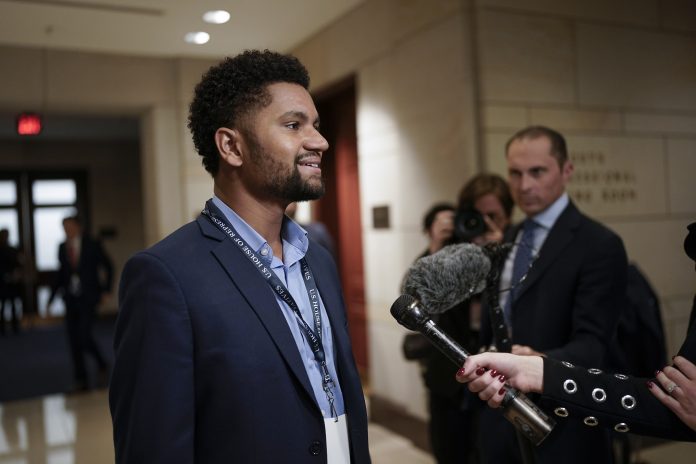
By
When Congressman-elect Maxwell Alejandro Frost is sworn into the 118th Congress on Jan. 3, the newest member of the Congressional Black Caucus might still be homeless.
Frost, the first-Generation Z member elected to Congress, is no different than approximately 6,300 other Washingtonians with no secure housing in place.
Homelessness, defined by the U.S. Department of Housing and Development (HUD), is an individual or family who lacks a fixed, regular, and adequate nighttime residence. Frost has proven even a member of the United States House of Representatives can be without a “fixed, regular and adequate nighttime residence. “
The National Alliance to End Homelessness estimates there are about a half million homeless citizens. Pat LaMarche, a homeless advocate, believes as many as 12 million persons experience homelessness. Roughly 13,000 homeless people die daily, and their life expectancy is about 50 years.
In preparation for his move to the District, the freshman U.S. congressman, representing Florida’s 10th Congressional district applied for housing and was denied.
“Just applied to an apartment in D.C. where I told the guy that my credit was really bad. He said I’d be fine. Got denied, lost the apartment, and the application fee,” Frost said via his official Twitter account. “This ain’t meant for people who don’t already have money.”
Despite his history-making victory at the midterm election in spite of a monthly salary that will be north of $14,000 once he takes office, will have to campaign for somewhere to lay his head while in Washington fighting for a more inclusive nation.
The exorbitant cost of living complements the credit dilemma many residents face living in the District of Columbia. Washington is one of the nation’s most expensive cities to live in. As of July 2022, the average rent for a one-bedroom apartment, according to a Bloomberg report, was $2,410. The overall cost of living is 51.2 percent higher than the national average.
Like many Americans with grandeur dreams, Frost used his credit card to finance a portion of his political campaign. He is one of approximately 48 million people with a FICO score between 300 and 579. Low credit scores have a far-reaching influence. In addition to fewer rental options, consumers are often required to pay deposits to turn on their utilities. Borrowing money and purchasing car insurance is more expensive. Securing employment, especially if the job demands managing money, is more difficult to achieve.
Frost quit his full-time job believing he had to invest full-time energy as a candidate. Working as many as 12 hours daily driving for Uber.
According to rentcafe.com, an online information platform that delivers information based on housing-related data, the average credit score a renter needed to rent an apartment in 2020 was 638. Darline Bridges, a Maryland-based real-estate agent, said landlords are less likely to approve applicants with low credit scores because creditworthiness potentially indicates how an applicant might care for the property.
“I’ve seen applicants with vouchers guaranteeing monthly payment to landlords who still denied those applicants,” explained Bridges. “A person’s credit maintenance gives landlords some indication about how the applicant will care for their property.”
Utilized as a metric to determine an applicant’s financial trustworthiness, credit checks historically reveal that scores are biased and perpetuate racial disparities.
The Orlando, Fla. native represents a population of American citizens struggling to manage their day-to-day financial responsibilities. After relocating from North Carolina, to Florida, Dena Rhodes, an aspiring author, believed her transition would be seamless. Instead, she struggled.
“I did DoorDash to hold me over until I could find permanent employment. I didn’t want to do it, but there was no other option,” said Rhodes.
Maxwell’s campaign’s promises stated he would win Medicare for all, transform the “racist criminal justice system, and work to end the climate crisis. Like many first-time U.S. Representatives, Frost will need to be creative in hurdling the housing crisis as well.
Alexandria Ocasio-Cortez, the youngest woman, at 27, elected to Congress in 2018, could not afford a Washington apartment before being sworn in. Several reports state that Cortez slept in her office for three months before securing an apartment. Days after her historic election, Cortez tweeted. “There are many little ways in which our electoral system isn’t even designed (nor prepared) for working-class people to lead.”
Casey Burgat, the legislative affairs program director at George Washington University, maintains that housing affordability is a universal problem. The lack of affordability “makes Congress exactly what it’s been for so long: a disproportionately wealthy, disproportionately White institution,” he said. “This is a main contributor to why people can’t afford to run for office. It’s not seen as a viable path. And though we’re getting a little better at our diversity, we still have a long way to go, and the cost of it is not getting cheaper.”
Frost realizes before he turns 30, his credit dilemma will be addressed, while many American citizens may continue to be handcuffed by an oppressive economic ideology that will grow more demanding. “We have to do better for the whole country,” demands Frost.


